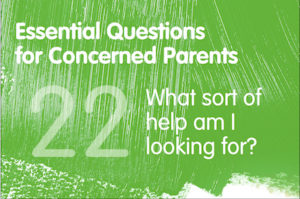 You may decide that you can’t do enough to help your child reduce his or her experience of distress all by yourself. Where should you turn for help?
You may decide that you can’t do enough to help your child reduce his or her experience of distress all by yourself. Where should you turn for help?
It amounts to a very different decision to take your child to a child psychologist whose speciality is talk and who uses techniques like play therapy or to take your child to a psychiatrist who routinely “diagnoses mental disorders” and who then “prescribes medication.” There are many types of helpers out there—peer counselor, school counselor, mentor, dietician, family therapist, residential treatment specialist, clinical psychologist, psychotherapist, psychiatrist—and each comes at human challenges from a different angle. Educate yourself as to what these different service providers actually provide and decide which sort of service makes the most sense to you.
Let’s say that your teenager is getting poor grades, doesn’t have friends, is morose, describes life as meaningless, and experiences great social anxiety. Will you aim for help for one of these, say by searching out a tutor to help with his math difficulties or a psychotherapist for his social anxiety, will you presume that these are all connected under the banner of “difficult teenage years” and press for peer counseling or a coping skills workshop, or will you go down the road of psychiatry, which will lead to a mental disorder diagnosis and chemicals? How you (and your child) conceptualize “What’s going on?” and “What might help?” will send you in one direction or another. Stay steady that the two questions “What’s going on?” and “What might help?” matter, even as you feel pulled to throw up your hands and aim your child at the first putative helper that pops to mind. Seriously considering these questions, even if you can’t land on perfect answers, will remind you that you have choices, that one choice might prove better than another choice, and that when you decide to try out one sort of help that doesn’t preclude you from also trying out some other sort of help.
*****
Read the Concerned Parents’ Project Introductory Post
To get in touch or to share your feedback, please email us
Read more on this topic
Interview: Alternative Children’s Mental Health
Visit Parent Resources for additional in-depth articles














